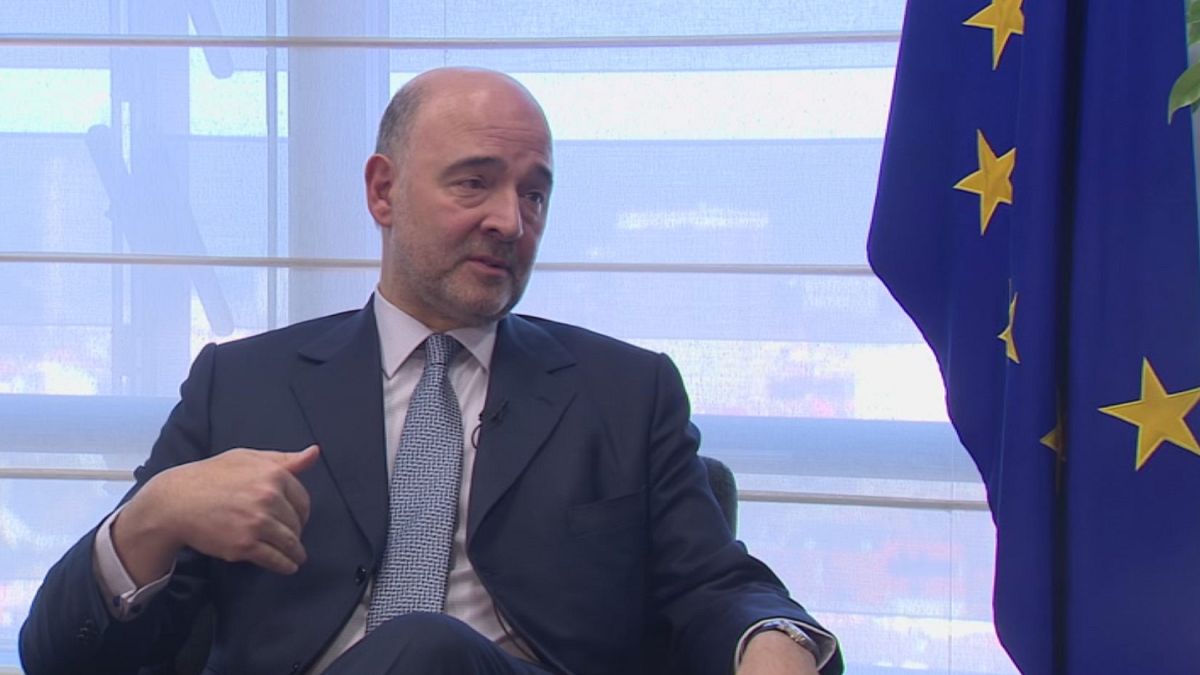Just before EU economy commissioner Pierre Moscovici visited Athens for high level talks, he spoke of the recent stalemate with the IMF and Grexit.
Two days before EU economy commissioner Pierre Moscovici visits Athens to hold talks with Prime Minister Alexis Tsipras, he spoke on euronews about the recent stalemate with the IMF and scenarios on Grexit.
Euronews, Efi Koutsokosta: Can you confirm that now you – and when I say you I mean the eurozone players and the IMF – that you have a common proposal on the table for Greece?
Pierre Moscovici, EU economy commissioner: We need to have a common proposal. But we have an assessment of the situation today. And the forecast I delivered shows that now Greece is on the way to huge progress. Greece has returned to growth in 2016. We then projected recession 0.3 percent in 2016 and we project very solid growth in 2017 at 2.7 percent and in 2018 3 percent which should put Greece among the leaders for growth in Europe. So, we are building a success story now, we must not interrupt that and that’s why I still consider that we need and we can close the second review soon and move towards the success of the third programme.
Euronews: When you say soon, do you think that the Eurogroup of February 20 is a realistic goal?
Pierre Moscovici: I hope so. I think that we have there a window of opportunity, that they are intensive discussions. The Greek authorities are taking their responsibilities, they must go on reforming the country. There are still efforts to be done but the partners of Greece have also to take their responsibilities.
Euronews: You speak about a success story but the IMF doesn’t agree so much with you. They say that of course Greek debt is highly unsustainable, that the fiscal targets agreed cannot be reached – at least with the programme and the reforms that have been agreed. So, do you really think you can really stay in this programme with the IMF on board and ask for the same things or are the Greeks going to pay for your disagreements with new austerity measures?
Pierre Moscovici: We, the Commission always want to move hand in hand with the IMF, the institutions must be together. That’s the condition for the success of the programme. But as far as figures are concerned ours are on the table and they show that there is up till now an overperformance of Greece as soon as the fiscal targets are concerned, and that should go on. And I think this is an objective basis that should be taken into account. Our figures were always right or even were not favourable enough. So every partner must work on that basis because it’s the objective basis and the forecast.
Euronews: But you are still asking for more measures, more austerity measures to vote now for 2019, 2020. Is it fair? And do you agree with that?
Pierre Moscovici: I am not talking about austerity. I am talking about a balanced package between some further reforms that need to be done for the sake of the Greek economy but also positive measures that have to be taken to secure the Greek people, we need to balance that.
Euronews: You’re speaking about pension cuts?
Pierre Moscovici: I think it’s impossible to impose more austerity on the Greek people but it is necessary and legitimate to have some more reforms in order to have more competitive and solid economic system in Greece. And I think we must strike the right balance between those imperatives.
Euronews: Given all these delays for the conclusion of the second review, we saw again scenarios on Grexit. And we saw this matter in the debate for the German elections this weekend between Martin Schulz and Wolfgang Schauble. Do you think that Grexit is still an option?
Pierre Moscovici: No. Grexit is not an option. Grexit was on the table – and I regretted that – before the agreement of July 2015. So, no question of a Grexit, that’s impossible and it wouldn’t be fair due to the actual performance of the Greek economy. This is a crisis that we must avoid and we will avoid. Let’s not talk about Wolfgang Schauble because he didn’t speak that way but for example the leader of the liberal party in Germany said that. For me, that’s not a reasonable attitude. We need Greece in the eurozone while building the conditions for a successful Greece in a stronger eurozone. We must go on with that success story.
Euronews: Given that after the Eurogroup meeting of February 20 there will be some major elections in Europe – the Netherlands, France and Germany. Do you think that all these delays could create a new crisis? What would be the case? And could these delays lead to a fourth bailout programme?
Pierre Moscovici: There cannot be a crisis. There won’t be a crisis. We will find a way, I am reasonably optimistic.
